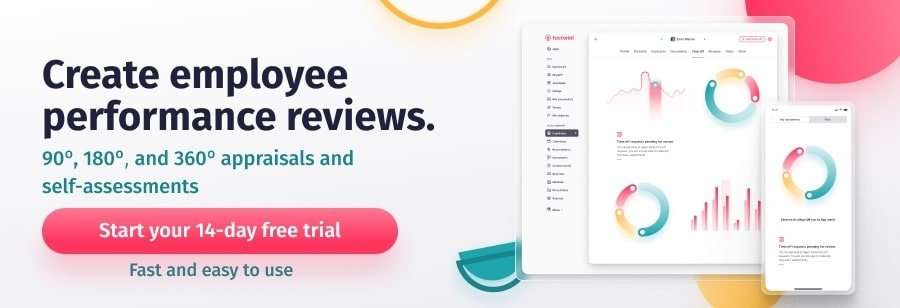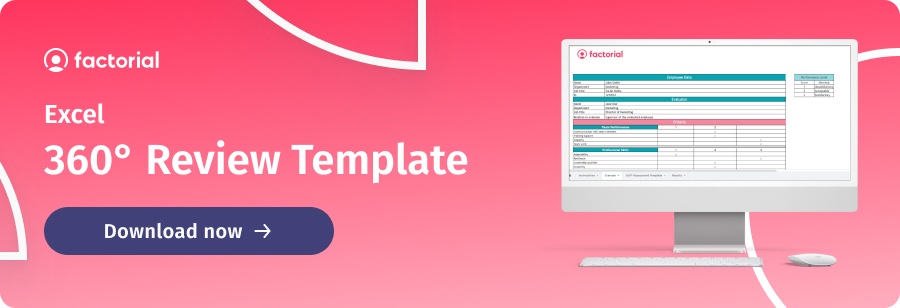A self-appraisal is a process where an employee reviews their own performance at work. It is an opportunity for employees to evaluate their strengths and weaknesses and can help them focus and develop their career paths. Self-appraisals are also a great way for employers to keep track of individual accomplishments and see how each area is performing so that adjustments and improvements can be made for the good of the bottom line of the business.
In this post, we will take a deep dive into the world of self-appraisals. We will look at what the process involves, and what benefits it can bring to both employers and employees. We will also look at some of the common questions often included in a company’s staff appraisal template and share some tips for writing the perfect self-appraisal.
- What Is a Self-Appraisal?
- Why Are Self-Appraisals Important?
- What to Include in a Self-Appraisal: Self-Appraisal Examples
- Self-Appraisal Tracking and Monitoring
- Tips for Writing the Perfect Self-Appraisal
What Is a Self-Appraisal or Performance Review?
A self-appraisal, also known as a performance appraisal, is a valuable tool used by managers and human resources departments to measure the progress and development of an employee. Usually included as part of an employee’s annual review, self-appraisals are often conducted through the completion of a self-evaluation survey. This survey gives employees a chance to communicate any achievements, measure their progress towards established goals, and discuss any issues or challenges they might be facing.
For the process to be effective, employees need to feel they can be open and honest about all weaknesses and challenges. Employers need to ensure they create a forum for open communication, and they must be open to discussing opportunities for employee growth and development. Employers should also ensure they design a comprehensive self-evaluation template so that all areas of an employee’s development are covered, and the right data is gathered, monitored, and analyzed consistently over time.
Why Are Self-Appraisals for Performance Reviews Important?
When implemented and managed effectively, the self-appraisal process can be hugely beneficial for both companies and employees.
Let’s take a look at some of the benefits of regular self-evaluation.
Benefits for Employees
- A self-appraisal gives employees an opportunity to self-reflect and analyze their own performance. This can help them establish any changes that could be made to improve their performance at work.
- By focusing on their strengths and weaknesses, self-appraisals can help employees gain insight and establish clear performance goals for the future.
- Appraisals are also a great opportunity for employees to shine and promote their strengths and accomplishments. This will usually have a positive effect on an employee’s confidence and make them feel empowered, boosting engagement and motivation levels. It can also encourage employees to apply for promotions and further their career development.
Benefits for Employers
- Employers get a better insight into how employees perceive their work and their daily tasks.
- Self-appraisal data analysis can help employers spot potential problem areas so that departmental changes can be made where necessary.
- Performance appraisals encourage employees to take ownership of their work and be more accountable for their actions.
- Compared to manager appraisals, self-appraisals help employees feel they are active participants in the review process, and that their opinions matter. This can have a positive impact on employee loyalty and trust.
- A regular staff-appraisal process opens up the lines of communication and can help improve employer-employee relations in the workplace, reducing potential conflict and staff disputes.
- By regularly analyzing self-appraisals, employers can gain an understanding of what motivates and incentivizes employees to do their best work.
What to Include in a Self-Appraisal: Examples and Comments
When an employee conducts a self-appraisal, they will usually be asked to consider questions such as the following:
- Are you happy with your current role?
- Do you feel your strengths are maximized here?
- Do you see yourself progressing within the company in three years?
- Have you taken responsibilities over and above your job description?
- Have you grown professionally in the last 6 months?
- Do you feel that you embody company values? If so, which ones?
- Do you consistently deliver on your work-related commitments?
- Did you spend sufficient time, attention and resources on your development?
- Have you met important deadlines/commitments over the last 3 months?
- Do you communicate effectively/share knowledge with others?
A self-evaluation form (also known as a staff review template), might also ask an employee to evaluate a series of SMART goals (Specific, Measurable, Achievable, Realistic, and Timely), as well as establish new SMART objectives for the next review period.
Take a look at this 360–degree appraisal template to see an example of a typical self-evaluation form.
Self-Appraisal Tracking and Monitoring
For self-appraisals to be truly effective for both employers and employees, the entire self-appraisal process needs to be regularly tracked and monitored. This helps managers track goals and monitor the performance of each individual in their team so that they can determine what training, resources, and guidance are required to improve underperforming areas. Data analysis and regular reporting can also provide insight into the performance and engagement of various departments, identifying areas for improvement.
If you’re an employer, performance management software can be a great solution for staying on top of your staff self-appraisals. A good employee performance management system helps human resources managers track and evaluate employee performance against established KPIs and provides employees with relevant training and professional guidance. Solutions usually include features for tracking and monitoring progress reviews, reporting, goal setting, real-time feedback, and rewards for improved performance.
Tips for Writing the Perfect Self-Appraisal
If you’re an employee, it can often be difficult to prepare for an appraisal as it requires a great deal of self-reflection and analysis. You need to think about your strengths and weaknesses, how you have performed compared to expectations, and what your goals are for the future. You also need to find a way to communicate all this information in a constructive and relevant way and establish quantifiable and achievable objectives for the future. All this can be quite daunting, especially if this is your first self-appraisal.
With this in mind, we have prepared a few appraisal tips for employees to help you get the most from the self-appraisal process and communicate everything you have to say. Follow these best practices and you will be ready to write the perfect self-appraisal for your next performance review.
If you’re an employer, you can use these tips to guide your employees through their self-appraisal process.
Establish the Purpose
The first thing to establish before you begin preparing your self-appraisal is the purpose behind it. Will it be used to determine whether you are eligible for a raise or a promotion? Or are you coming to the end of your probationary period? Will it form a part of your annual review? Is it an informal self-appraisal, or will the results of your survey be shown to other managers and executives?
Understanding why your boss has asked you to complete a self-appraisal form will have an impact on your focus and motivation. If it’s an informal review, then you can focus on strengths and weaknesses. If it’s part of a bigger performance review, then you will also need to work on data and analytics to back up your achievements and demonstrate your worth to the company.
Make Sure You Prepare
As the old saying goes, failing to prepare is preparing to fail…
Once you understand the purpose behind your self-appraisal, you can start preparing. If you have been aware of the upcoming cycle of performance appraisals, then you may have already started taking notes about your struggles and achievements. If you haven’t, then now is the time to self-reflect.
Is there anything preventing you from performing to the best of your abilities? Are there any changes you could make to improve your overall performance? What about your daily tasks and duties – are then any established processes or procedures stopping you from doing your job?
This is also a good time to make a list of your weaknesses and any areas you would like to work on over the next review period. For example, you might struggle with your monthly sales reports because you don’t really understand how to use Excel formulas. Performance appraisals are a great opportunity to bring this up. Your manager may decide to send you on a course if you can convince them that it will improve your performance.
Highlight Your Accomplishments
Once you’ve taken a long hard look at your weaknesses, the next step is to highlight your accomplishments.
What positive contributions have you made to the company? Have you reached the objectives set at your last performance appraisal? If so, explain what changed to help you reach these goals. What did you learn from the experience?
Ideally, you should try to maintain a running list of accomplishments throughout the year. That way there’s no risk of something slipping through the net. If you haven’t done this, then it’s time for a bit of self-reflection again. You might find that reviewing the past year’s work calendar helps jog your memory about any significant assignments, projects and successes.
Try to include relevant data and metrics to illustrate your examples. Use clear and specific examples to highlight your achievements and demonstrate the unique value you bring to the company.

Be Honest and Critical
The most important piece of advice you can get is quite simple: be honest and critical. This is the only way to truly benefit from the self-appraisal process. This isn’t a sales pitch – it’s an opportunity to conduct an honest, no-holds-barred critical assessment of every element of your job. Yes, you want to showcase your strengths and achievements, but you also need to critically assess your failures. If you didn’t meet performance expectations in certain areas of your job, what prevented you from performing? What can you do, or what can your employer do, to make sure you learn from your mistakes and perform better next time? By showing your manager your flaws, you demonstrate your ability to self-reflect, learn and grow.
Being critical doesn’t mean being self-deprecating though. Own up to your mistakes but do so in the context of professional development. In other words, acknowledge your problem areas, and ask for support to address the issues and overcome any performance challenges. Instead of saying “I failed at this”, say “I want to improve on this”. That opens the door to training and development, rather than focusing on your shortcomings.
Be Professional
Make sure you are professional at every stage of the self-appraisal process, whether data is collected through self-evaluation surveys or a self-appraisal statement.
- Make sure your tone is professional throughout, and that there are no spelling mistakes or grammatical errors in your statements.
- Don’t exaggerate your strengths or weaknesses.
- Be concise and straight to the point.
- Equate your accomplishments to specific examples, KPIs and establish metrics.
- Keep things positive and don’t personally criticise your boss or colleagues.
- Don’t be overly personal (although you should raise any personal issues that may have a direct impact on your performance).
Set Goals
The final step of the self-appraisal process is setting set clear, quantifiable self-appraisal goals for the future. Where do you see yourself in 6 months’ time? What do you need to do to get there? How do you see yourself evolving in the company? Do you have a specific promotion in mind? This will help you communicate a clear path for the future and establish clear benchmarks for getting there.
Additionally, setting obtainable goals that push you out of your comfort zone will also demonstrate to your manager that you are willing to learn, grow and develop. This leaves you open to more opportunities in the future, cementing your position as a valued member of the organization.


